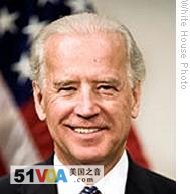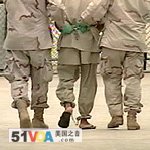Washington
26 January 2009
U.S. Vice President Joe Biden says he expects most of the 245 detainees held at the U.S. military detention center at Guantanamo Bay, Cuba will be deported to their home countries or other nations and that the facility will be closed within a year.
 |
| Vice President Joe Biden |
"If they are not a U.S. citizen or if they're not here legally, then, even if they were released by a federal judge, they would not be able to stay here in the United States," he said. "They would be sent back to their country of origin."
Biden told CBS television's "Face the Nation" program that he does not expect the detainees to remain on American soil even if their home countries refuse to accept them.
"What I anticipate happening is that those people where, in a situation where the evidence is in question or it's going to be hard to make a case, we will most likely be rendering them back to their country of origin or another country," he said. "For example, there are already countries who have agreed to allow prison facilities in their countries for enemy combatants that, in fact, are captured on the battlefield."
The vice president says President Barack Obama's administration is evaluating each of the suspects on a case-by-case basis and acknowledges it is a difficult process. Biden says the way the detention facility was opened and operated raises additional issues as to how these cases will be handled in civil and military courts.
"The one thing we know, the maintenance of Guantanamo, its symbol and the consequences of the symbolism [of Guantanamo] around the world - it has grown terrorist organizations, not diminished terrorist organizations," he added. "There is no question it has to be closed and we don't think it's inconsistent to deal with our national security and our Constitution. We don't think they're inconsistent."
 |
| A detainee at Guantanamo Bay, Cuba being escorted by two U.S. soldiers (file) |
In one of his first acts as president, Barack Obama last week ordered the closure of the U.S. naval detention center at Guantanamo Bay within one year. The facility was established by former President Bush to house foreign terror suspects in the wake of the September 11, 2001 terrorist attacks on New York and Washington.
President Obama and Defense Secretary Robert Gates have directed that a motion be filed to suspend the Guantanamo Bay trials for 120 days. The cases that have been suspended include proceedings against five men accused of plotting the September 11 attacks. Among them is Khalid Sheikh Mohammed - the alleged architect of the attacks.
On CNN television's "State of the Union" program, former U.S. Navy defense attorney Charles Swift said he does not expect suspects like Mohammed will go free.
 |
| Khalid Shaikh Mohaammed (file) |
Swift commends the new Obama administration for ending military commissions for the terror suspects, saying the outcomes of those trials would not have credence internationally. He also says that closing Guantanamo creates the domestic political will necessary to find a permanent solution on relocating the detainees outside of the United States.
But, according to some analysts and former Bush administration officials, the order to close the Guantanamo Bay facility carries risks. They note that earlier this month, the Defense Department estimated that as many as 61 freed detainees have returned to waging terror.